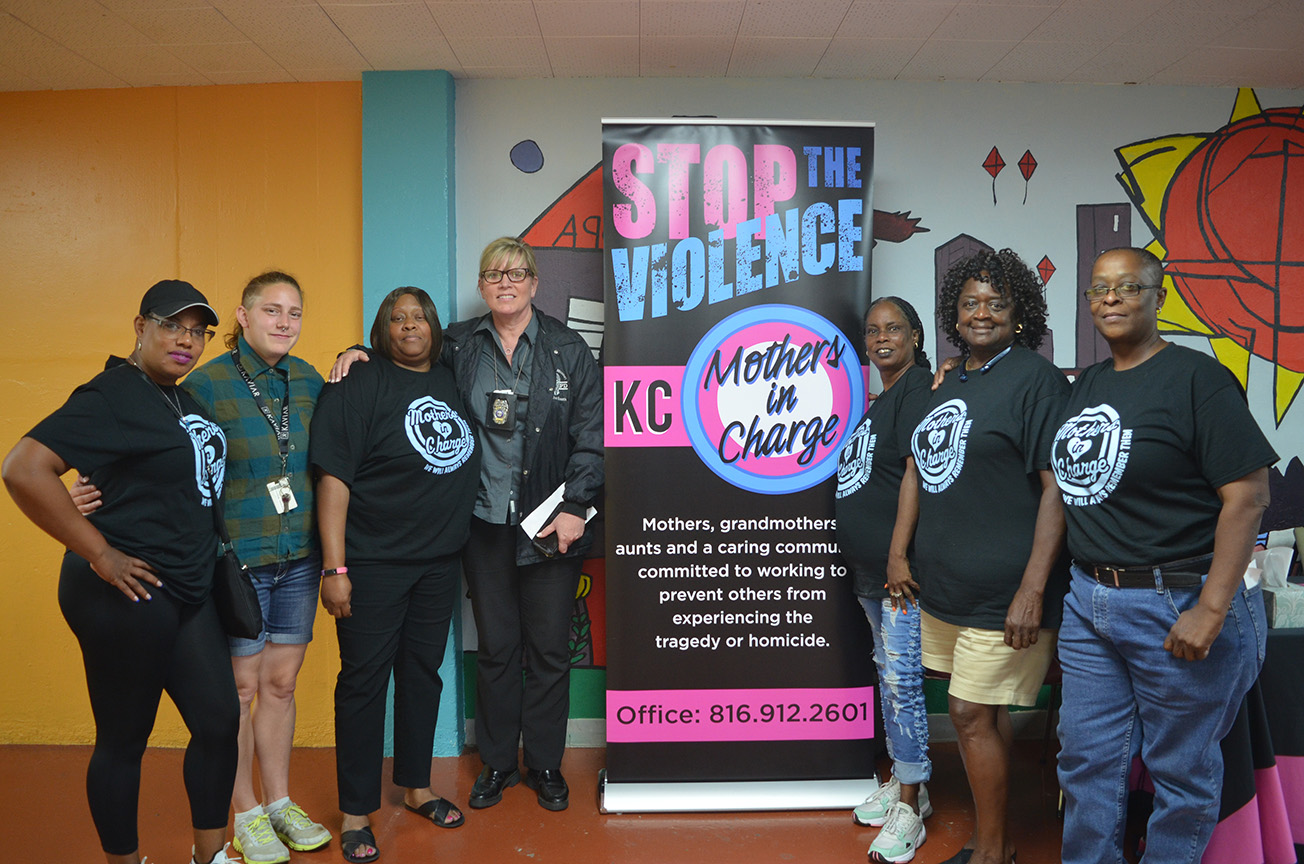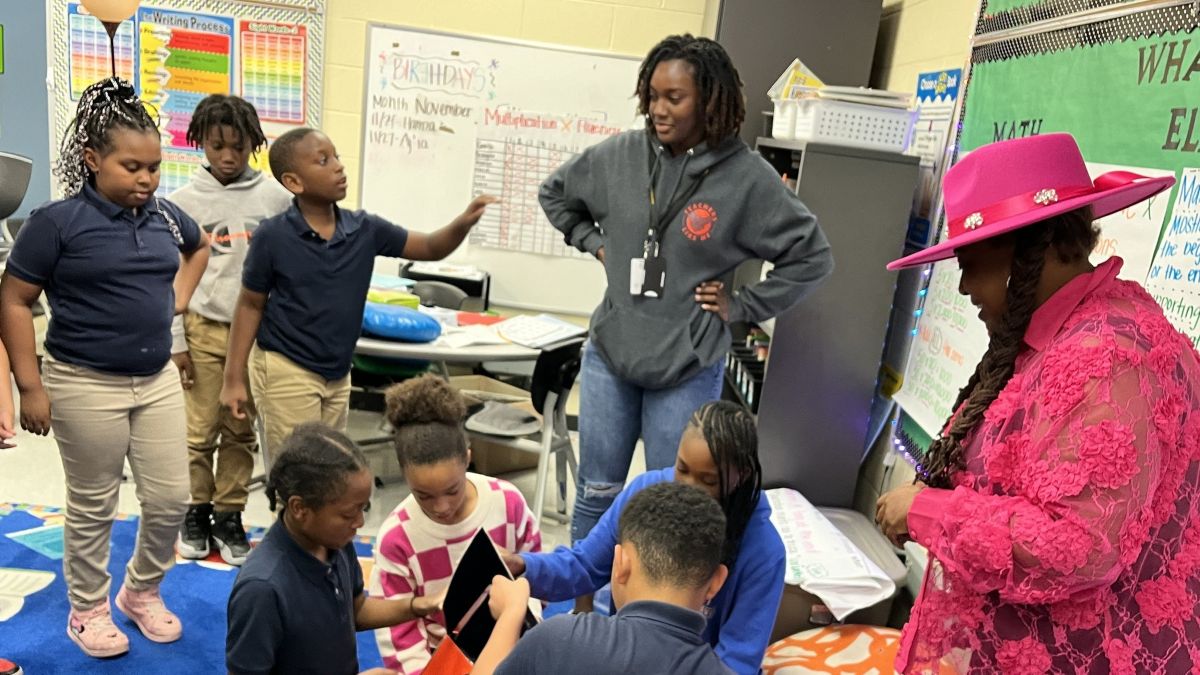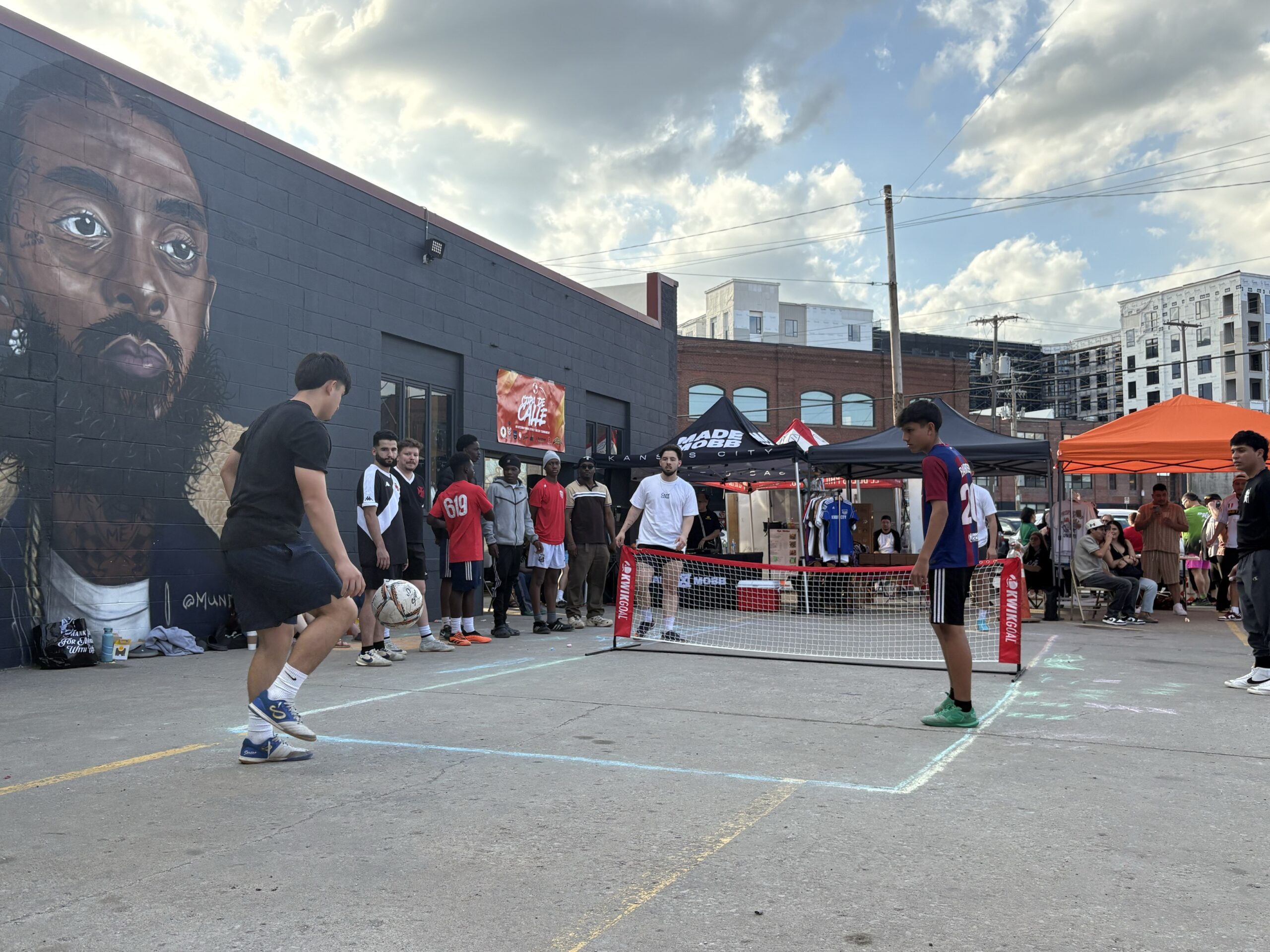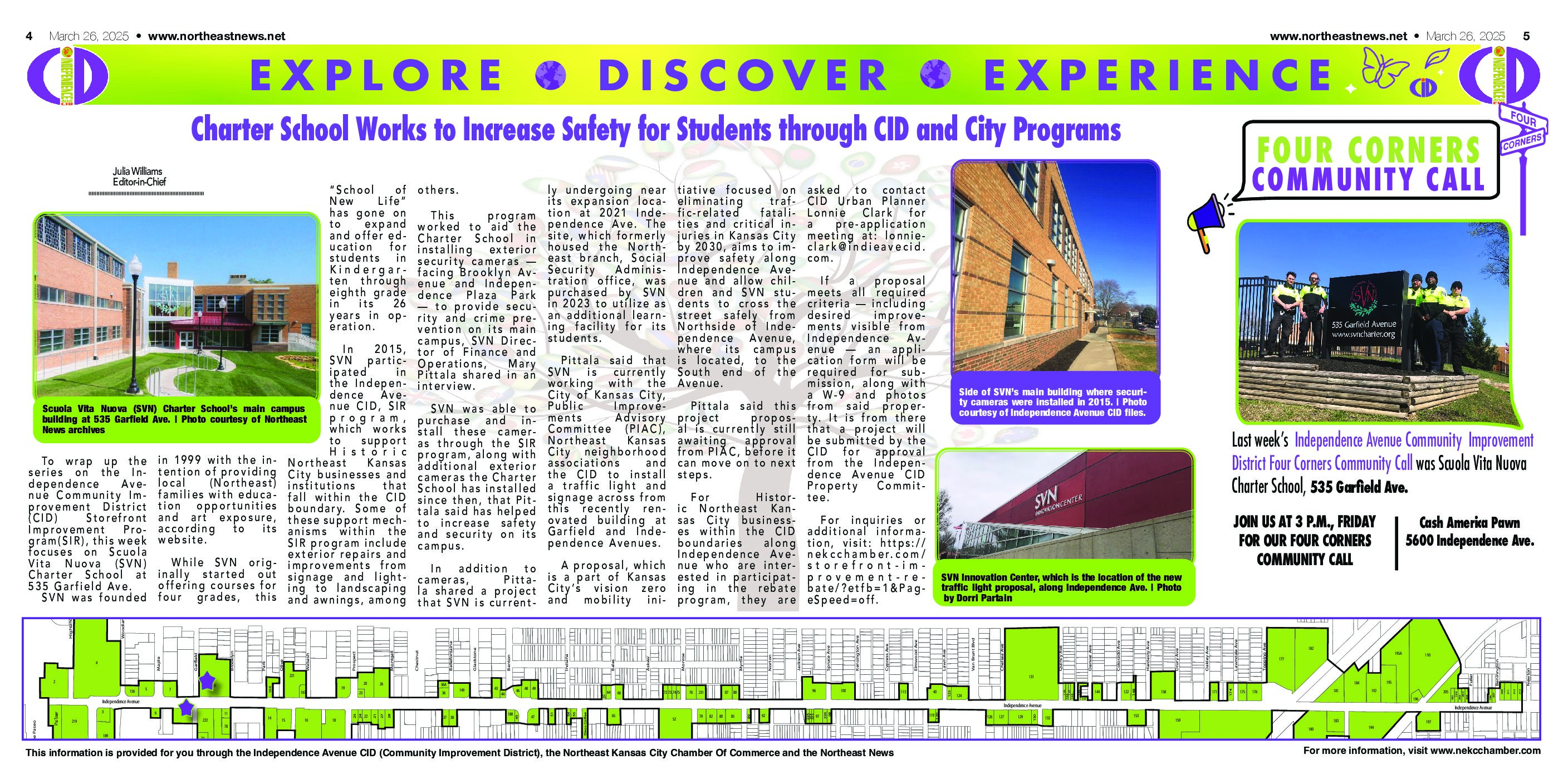Elizabeth Orosco
Northeast News
Kansas City Mothers in Charge teamed up with Kansas City Police to offer a “Hope and Healing” session for families who have been touched by homicide.
Even though not one participant showed up, that did not stop the two agencies from wanting to spread their message.
They sat down with the Northeast News to talk about what services they offer and what role KCPD Homicide Unit plays in investigating deaths in the KC metro area.
KC Mothers in Charge is a group of mothers, grandmothers, aunts, and community members who have been working together since 2014 to “stop the violence” and tragedy of homicide in Kansas City.
They offer education, support services, intervention, counseling, and guidance to families across the metro area.
Latrice Murray, outreach specialist with KC Mothers in Charge, says their next goal is to get the Northeast community involved and accepting their services.
Murray, whose son was killed in 2009, said she wants people to know about KC Mothers in Charge, to trust them, and to let them offer their services to the community.
Murray said working alongside KCPD has been extremely beneficial and they have a great relationship.
“We are married. I love working with them and I know they love working with us,” she said. “We just collaborate and it’s been a great relationship. We respect them and they respect us. We help each other any way we can.”
Alane Booth, KCPD homicide detective, said she wants people to know that homicide detectives truly care.
They care about the victim, the families, and ultimately, getting the crime solved as quickly as possible.
Both Murray and Booth said it often helps to bring a member of KCPD along during the presentations because it “puts a human aspect” on who they are and what they do.
Booth said her goal is to paint a clear picture of what the investigation process looks like and to remind people that detectives are people, too.
“I want to demystify investigators and to let them see that I’m a living, breathing human being,” Booth said. “I want people to see the human side of us and understand the demands that are placed upon us because of our schedules with the number of homicides that we have.
KCPD has four homicide squads with six detectives each, who rotate on call. In the event of a murder, officers assess the situation and if it seems suspicious in nature, the detectives are called to the scene.
“If a murder happens at two in the morning and I’m on call, I have to get up, take a shower, get dressed, get my family situated, and then drive to the scene,” Booth said. “That can take some time and we always appreciate when witnesses stick around and wait.”
Booth said it’s helpful for people to know that detectives are working multiple cases at once and have even had as many as three murders in an hour, with six detectives attempting to work each scene.
As of July 25, there have been 31 homicides in East Patrol, 28 in Metro, and 13 in Central Patrol.
Booth said her longest day was 36 hours without going home.
“We miss Christmases, holidays, and special events because if a murder happens, we drop everything and handle the situation, and we are willing to do it,” Booth said. “We don’t begrudge the process because it’s gratifying to make a call to a mother and tell them we have caught the person that killed their loved one and they are in custody.”
Booth said understanding the process of how homicides are investigated is helpful for people to get a clear picture of what is going on during an investigation.
In the event of a murder, Booth said officers conduct an area canvas, knock on doors, look for potential video footage, and contact eye-witnesses.
Once the preliminary investigation is underway, the scene is processed and evidence is recovered.
Booth said a lot of people are disturbed by how long a body remains on the ground, but it is part of the process as the scene is worked from the outside in.
“The body is evidence at this point,” she said. “I don’t want to sound disrespectful or callous, but whatever your religious faith is, the soul has passed on and now, this body is just our vehicle to get around and is evidence.”
Booth said crime scene investigators do measurements of where the body is lying in proportion to other surrounding buildings, and they create their crime scene report to scale.
“We don’t know how that person was killed,” Booth said. “Was there a fight? Were they dumped there? Were they knocked down or have physical contact with someone? We can’t disturb the body at all. We have to collect all fibers, shoe impressions, and hairs. If we rush in and take the body, we could lose a lot of evidence.”
She said a lot of times, leaving the body on the ground is misconstrued as the officers and detectives not caring, but she said that couldn’t be further from the truth.
“It’s never, never because we don’t care. It is actually because we do care,” she said. “We are trying our best to collect and preserve any potential evidence. We have had homicide cases that were solved literally by a cat hair. We can’t disturb or lose that kind of evidence.”
Booth said once the scene is worked, the victim is transported to the medical examiner’s office, the detectives meet up, brief each other, and determine what leads to follow-up with. Once they find a good breaking point, they will go home and get some rest.
“We are often working until five or six in the morning. Just because we go home and get some sleep does not mean we don’t care. We just absolutely have to go home and get rest before we come back,” she said.
Booth said the cases where she has had the most success are the ones with families who were most cooperative and supportive.
“Once we get a chance to talk and they can see my level of commitment, they realize it’s a team effort,” she said.
One case she recalls specifically was one where the children in the family spoke English, but the parents did not. She said the parents were receptive to allowing them to speak to the children to solve the case.
“We wanted to get to the bottom of it quickly and create as little disturbance or disruption as possible. Their help was beyond appreciated,” she said.
Booth said she wants to make sure the community is aware that legal status is not asked during these investigations.
“No matter who is a victim of violent crime, the last thing we think about is your status. It is the last thing, if at all. We are just trying to figure out what happened. People should be able to just exhale with that knowledge,” she said.
Recently, the TIPS hotline reward for tips leading to an arrest in a homicide case rose from $10,000 to $25,000—the highest reward in any city in the country.
TIPS Hotline reward
How exactly does the TIP Hotline work?
Detective Kevin Boehm outlined how anonymous callers receive their cash reward if they are indeed, anonymous.
When a caller dials the TIPS Hotline, the information is taken down and the caller is issued a code number as their identity.
Boehm said the call is never tracked and there is no caller ID.
The anonymous tip is then sent to the police for further investigation. If an arrest is made, Crime Stoppers is notified of the successful tip.
Each month, the anonymous caller is directed to call back into the TIPS Hotline to check on the status of their tip on the first Tuesday of every month.
The Crime Stoppers Board approves tips every month.
Boehm said the tip is considered successful if it leads to an arrest or filing of charges. Tipsters don’t have to wait for a conviction.
If an anonymous tipster’s information led to an arrest or filing of charges, the tipster is then notified of a predetermined location to collect their reward money.
The money is paid in cash, not taxed, and is paid right away.
“We never see our tipsters. It’s always sight unseen,” said Boehm.
Crime Stoppers is not a part of the Police Department. A forty-member volunteer citizen board of directors oversees the Crime Stoppers TIPS Hotline, which is a nonprofit program under the 501.c.3. umbrella of the Kansas City Metropolitan Crime Commission.
Murray said for her, the scary part is not knowing.
“My son’s case is still unsolved. He was killed in 2009, When I go out, I might be standing next to the person who killed him and I will never know that. We need to come together. If these people are still running out here, they are still doing the same old same old. If you kill once, you’ll kill again, especially if you get away with it.
For more information on Crime Stoppers, visit kccrimestoppers.com.
For more information on KC Mothers in Charge, visit kcmothersincharge.org.




















